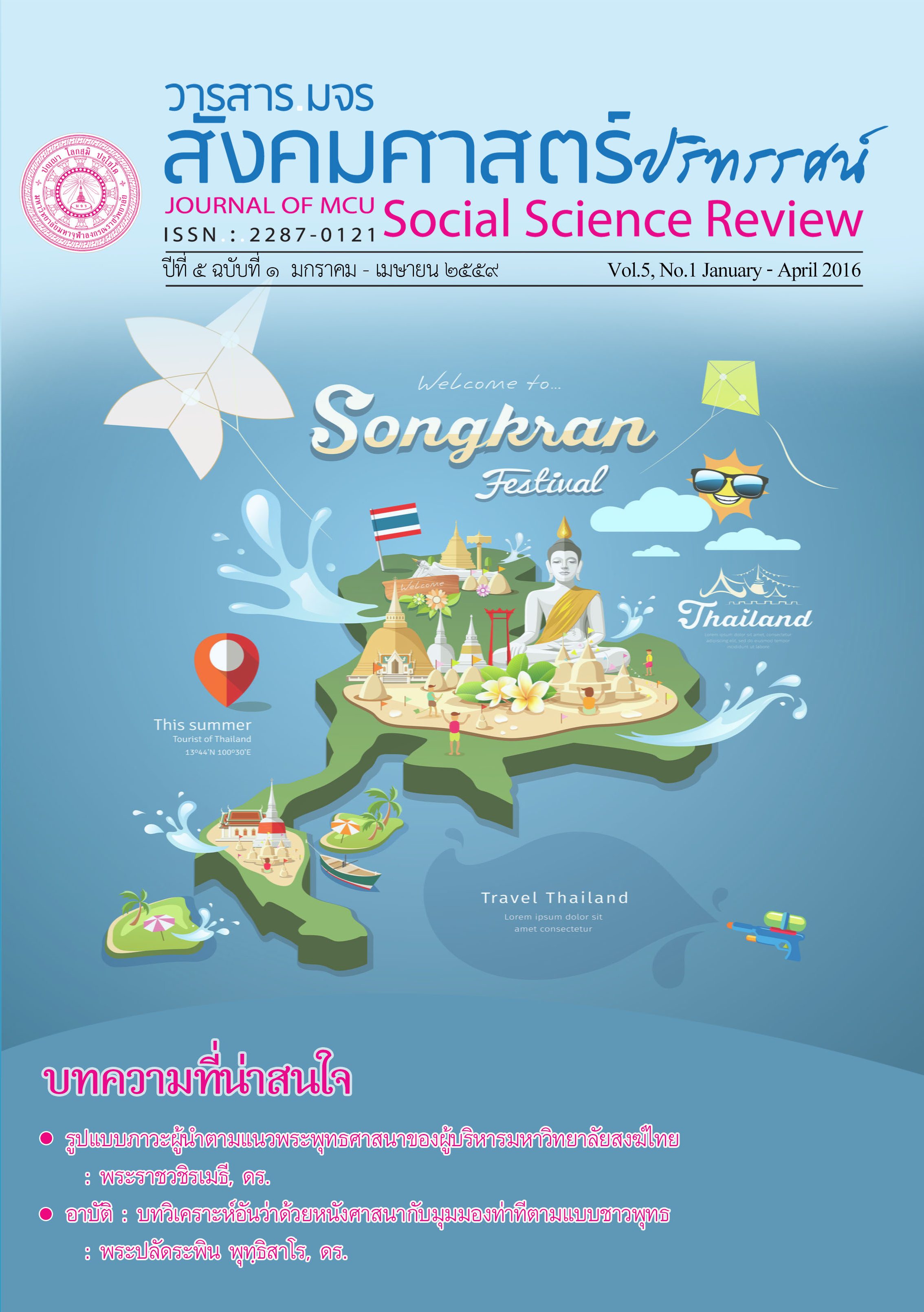ปัจจัยที่มีผลต่อการดําเนินชีวิตตามวิถีสังคมชาวพุทธ : กรณีศึกษาการดำเนินชีวิต ตามหลักพุทธศาสนาของชุมชนในเขตเทศบาลเมืองลพบุรี จังหวัดลพบุรี
คำสำคัญ:
การดําเนินชีวิต วิถีสังคมชาวพุทธ หลักพุทธศาสนา ชุมชนในเขตเทศบาลบทคัดย่อ
บทความวิจัยฉบับนี้ มีวัตถุประสงค์เพื่อศึกษาประเด็นสำคัญของปัจจัยที่มีผลต่อการดำเนินชีวิตตามวิถีสัดมชาวพุทธ และศึกษาปัจจัยที่มีผลต่อการดำเนินชีวิตของชุมชนตามวิถีสังคมชาวพุทธที่สอดคล้องกับบริบทของสังคมชุมชนในเขตเทศบาลเมืองลพบุรี การวิจัยใช้ทั้งการใช้ระเบียบวิธีวิจัยเชิงปริมาณและเชิงคุณภาพ (Mixed Methodology) วิเคราะห์ด้วยสถิติเชิงพรรณนาและการวิเคราะห์องค์ประกอบปัจจัย (Factor Analysis) กลุ่มตัวอย่างที่ใช้ในการวิจัยได้แก่หัวหน้าครัวเรือนในชุมชนในเขตเทศบาลเมืองลพบุรี จำนวน ๓๖๐ ครัวเรือน ส่วนการวิจัยเชิงคุณภาพผู้วิจัยนนที่การการสัมภาษณ์เชิงลึกผลการวิจัยพบว่าการวิจัยปัจจัยที่มีผลต่อการดำเนินชีวิตตามวิถีสังคมชาวพุทธ : กรณีศึกษาการดำเนินชีวิตตามหลักพุทรศสนาของชุมชนในเขตเทศบาลเมืองลพบุรี จังหวัดลพบุรี มีคำเฉลี่ยเป็นปัญหาปฏิบัติไได้มากที่สุด คื คารทำตนให้เป็นอิสระ หลุดพัน เป็นนายเหนือโภคทรัพย์ มีค่าเฉลี่ย (X -๒.bดb) รองลมา คื ทำการโดยใช้ปีญญา สุภาพ ไม่ดื้อด้าน ยินดีรับฟังผู้อื่น เสงี่ยมงาม รักความประณีต สะอาด เรียบร้อย พูดจานฟัง ทั้งกายก็อ่อนโยนไม่หยาบคาย มีค่าเฉลี่ย (X -๒.๖๐๐๐)และน้อยที่สุด คือ การไม่คบชู้สู่หา มัวหมกนในเพศ ประพฤติดี มีวินัย ตั้งอยู่ในศีล ๕ มีค่าเฉลี่ยX=๒.b๕oo)ผลการวิจัยโดยการวิเคราะห์ปัจจัย พบว่า ปัจจัยที่มีผลต่อการดำเนินชีวิตตามวิถีสังคมชาวพุทธ : กรณีศึกษาการดำเนินชีวิตตามหลักพุทธศาสนาของชุมชนในเขตเทศบาลเมืองลพบุรีจังหวัดลพบุรี ประกอบด้วย ๒ ปัจจัย คือ ปัญหาการครองตนเพื่อความสุขในชีวิต ประกอบด้วยตัวแปร ๑๘ ตัว ซึ่งมีค่น้ำหนักตัวแปรในปัจจัยอยู่ระหว่าง o.๗๖๖ ถึง 0.๕๗ค มีค่า Eigen values =๒o.c ค่ร้อยละของความแปรปรวนที่อธิบายได้ด้วยปัจจัยที่ ๑ = ๖๗.๖๐๖ ปัจจัยนี้จึงมีความสำคัญเป็นอันดับที่ ๑ และปัจจัยที่ ๒ เรียกว่ปัญหาคุณธรรมในการครองตน ประกอบด้วยตัวแปร ๑๒ ตัว ซึ่งมีค่น้ำหนักตัวแปรในปัจจัยอยู่ระหว่าง .๗๙"'๖ ถึง ๑.๖๐๙ มีค่า Eigen values =๑,๑๗๐ ค่ร้อยละของความแปรปรวนที่อธิบายได้ด้วยปัจจัยที่ ๒ = ๓.๘๙๘ ปัจจัยนี้มีความสำคัญเป็นอันดับที่ ๒
เอกสารอ้างอิง
กระทวงศึกษาธิการ. ลพบุรีรนีแห่งอารยธรรม. กรุงเทพมหานคร: โรงพิมพ์องค์การค้าของคุรุสภา, ๒๕๔๔.
ธานินทร์ ศิลป์จารุ. การวิจัยและการวิเคราะห์ข้อมูลทางสถิติด้วย SPรร และ AMOS.กรุงเทพมหานคร บริษัท เอส. อาร์ พริ้นติ้ง แมสโปรดักส์ จำกัด, ๒๕๕๕.
นิเวศน์ วงศ์สุวรรณ. ศาสนศึกษา. กรุงเทพมหานคร: โรงพิมพ์ สหธรรมมิก จำกัด, ๒๕๕๔.
พระธรรมปิฎก (ป..ปยุตโต), ธรรมนูญชีวิต กรุงเทพมหานคร : สำนักพิมพ์ธรรมสภา, ๒๕๕๔.
มหาวิทยลัยสุโขทัยธรรมาธิราช. ความเชื่อและศาสนาในสังคมไทย. นนทบุรี: สำนักพิมพ์มหาวิทยาลัยสุโขทัยธรรมาธิราช, ๒๕๕๕.
มหาวิทยาลัยมหาจุฬาลงกรณรชวิทยลัย.งนวิจัยและวรรณกรรมทางพระพุทธศาสนา.กรุงเทพมหานคร: ห้างหุ้นส่วนจำกัด นวสาส์นการพิมพ์, ๒๕๕๑.
วิโรจ นาคชาตรี.พุทธปรัชญาเถรวาท. กรุงเทพมหานคร: สำนักพิมพ์มหาวิทยาลัยรามคำแหง,๒๕๕0.
สุวิมล ติรกานันท์. ระเบียบวิธีการวิจัยทางสังคมศสตร์ : แนวทางสู่การปฏิบัติ. กรุงเทพมหานคร:โรงพิมพ์แห่งจุฬาลงกรณ์มหาวิทยาลัย, ๒๕๔๙.
สุมน อมรวิวัฒน์. หลักบูรณาการทางการศึกษาตามนัยแห่งพุทธธรรม. นนทบุรี: โรงพิมพ์มหาวิทยาลัยสุโขทัยธรรมาธิราช, ๒๕๔๔.
สุชาติ โสมประยู และวรรณี โสมประยูร. เทคนิคและประสบการณ์งนวิจัยทางการศึกษา.กรุงเทพมหานคร: สำนักพิมพ์บริษัท พัฒนาคุณภาพวิชาการ (พว.) จำกัด, ๒๕๔๗.
๒. ภาษาอังกฤษ :
(I) Books:
Creswell, J.W. Research Design: Qualitative, Quantitative and Mixed MethodsApproaches. (2" edition).Thousand Oaks, CA: Sage Publications, 2013.
Greene, J.C. Mixed Methods in Social Inquiry. San Francisco: Jossey-Bass, 2007.
Tashkkori, A., & Teddlie, C. Mixed Methodology Combining Qualitative andQuantitative Approaches. Thousand Oaks, CA: Sage, 1998.
ดาวน์โหลด
เผยแพร่แล้ว
รูปแบบการอ้างอิง
ฉบับ
ประเภทบทความ
สัญญาอนุญาต
ลิขสิทธิ์ (c) 2016 วารสาร มจร สังคมศาสตร์ปริทรรศน์

อนุญาตภายใต้เงื่อนไข Creative Commons Attribution-NonCommercial-NoDerivatives 4.0 International License.
เพื่อให้เป็นไปตามกฎหมายลิขสิทธิ์ ผู้นิพนธ์ทุกท่านต้องลงลายมือชื่อในแบบฟอร์มใบมอบลิขสิทธิ์บทความให้แก่วารสารฯ พร้อมกับบทความต้นฉบับที่ได้แก้ไขครั้งสุดท้าย นอกจากนี้ ผู้นิพนธ์ทุกท่านต้องยืนยันว่าบทความต้นฉบับที่ส่งมาตีพิมพ์นั้น ได้ส่งมาตีพิมพ์เฉพาะในวารสาร มจร สังคมศาสตร์ปริทรรศน์ เพียงแห่งเดียวเท่านั้น หากมีการใช้ภาพหรือตารางหรือเนื้อหาอื่นๆ ของผู้นิพนธ์อื่นที่ปรากฏในสิ่งตีพิมพ์อื่นมาแล้ว ผู้นิพนธ์ต้องขออนุญาตเจ้าของลิขสิทธิ์ก่อน พร้อมทั้งแสดงหนังสือที่ได้รับการยินยอมต่อบรรณาธิการ ก่อนที่บทความจะได้รับการตีพิมพ์ หากไม่เป็นไปตามข้อกำหนดเบื้องต้น ทางวารสารจะถอดบทความของท่านออกโดยไม่มีข้อยกเว้นใดๆ ทั้งสิ้น





